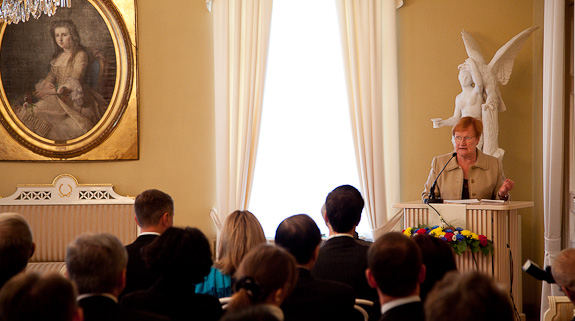The President of the Republic of Finland: Speeches and Interviews
Speeches, 10/22/2010
Speech by President of the Republic Tarja Halonen at a seminar “UN Resolution 1325 'Women, Peace and Security' Ten Years after Launching” on 22 October 2010
 President Halonen speaks at the seminar. Copyright © Office of the President of the Republic of Finland
President Halonen speaks at the seminar. Copyright © Office of the President of the Republic of Finland(check against delivery)
It is really a pleasure to welcome all of you to this seminar marking the ten-year anniversary of United Nations Security Council Resolution 1325 on women, peace and security. Resolution 1325 set forth new criteria for viewing conflicts and peace-processes by promoting the protection and inclusion of women. Most importantly, it asserted that women are powerful actors in resolving conflicts and promoting sustainable peace.
We all know the important role of Elisabeth Rehn and Ellen Johnson-Sirleaf in the birth of the Resolution. It is a real pleasure that you are here today Elisabeth.
In a decade, progress has been achieved. The role of women in building peace, security and development is already widely recognised, as the UN General Assembly in September clearly demonstrated. There is an increased awareness and understanding of gender perspective and the human rights dimension of conflicts.
We know that conflicts increasingly affect civilians who are not involved on fighting – especially women and girls. They are left unprotected and often directly targeted by conflict parties. More concrete actions are needed to protect women and girls from violations and enhance their involvement in all levels of peace processes. To accelerate the efforts, we need collaboration across borders and organizations. There is still much work to do to fully implement Resolution 1325.
Resolution 1325 can be described as a “living” resolution. National and regional action plans have become the primary tool in implementing 1325. We in Finland completed our own plan in 2008. It is based on the idea of mainstreaming the gender perspective and the different needs of women and men in all activities and policies. Gender aspects have, for example, become an important dimension in developing civil and military crisis management. Combating violence against women in our own country is also part of our 1325 plan.
We have also established a so called twinning cooperation with Kenya on 1325 to produce their national action plan. I have understood that the process has been very fruitful. Through this cooperation we have an opportunity to learn from each other’s experiences.
The United Nations has also actively sought to strengthen the implementation. The Security Council has adopted several new resolutions – 1820, 1888, and 1889 – that are based on 1325. The position of Special Representative on Sexual Violence in Conflict was also created last year. We trust this position will help achieve the much needed progress in the implementation. I am very glad that Special Representative Margot Wallström is with us today.
The establishment of a new gender entity “UN Women” is also very welcome. We believe that it will offer a holistic approach to gender-sensitive decision-making in the United Nations context. Gender equality is also a key dimension in reaching the UN Millennium Development Goals. The implementation of the Goals will improve especially the situation of women and girls, not forgetting the men.
* * *
Last year, we convened together with President of Liberia Ellen Johnson-Sirleaf the International Colloquium on women's leadership, empowerment and security. Nearly 2000 women and men attended the Monrovia meeting. It sent a strong message about the need to fully implement this Resolution.
I have proposed that one concrete step forward would be to classify systematic rape as a forbidden weapon of war. This proposal is included in the Monrovia meeting’s Call to Action on Resolution 1325. Reintegration support should be tied to effective surrender of weapons and eradication of violence, including rapes. Involvement of women in peace negotiations and peace-building in post-conflict societies is of crucial importance. It brings out a clear picture of the concrete situation.
Security must mean security for everyone, women and girls included. Equality, human rights, and justice are needed before any conflict can be solved or prevented. Harming women and children harms the whole society. Violence may cause a lifelong trauma for the victims. This is why reintegration is of utmost importance in post-conflict reconstruction. Education and economic empowerment of women is a key to success.
Consistent and coherent work against impunity related to war crimes and grave human rights offences remains an important goal at the global level. The ad hoc International Criminal Tribunals for the Former Yugoslavia, Ruanda and the Special Court for Sierra Leone have made pioneering work in ending the impunity for sexual crimes through their prosecutions and consecutive judgments.
The Rome Statute of the International Criminal Court is a milestone as it defines the gravity of sexual violence as comparable to a crime against humanity. It also establishes sexual violence as a war crime in both conflicts of an international and non-international character. The ICC gives victims, including women and children, a platform to have their voices heard through participation at the proceedings.
* * *
This event is an opportunity to share our experiences in implementation of 1325, and I am very happy that all of you are here together to continue this work.
About this site webmaster[at]tpk.fi



